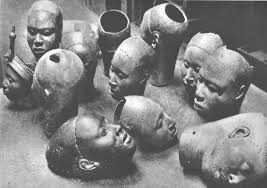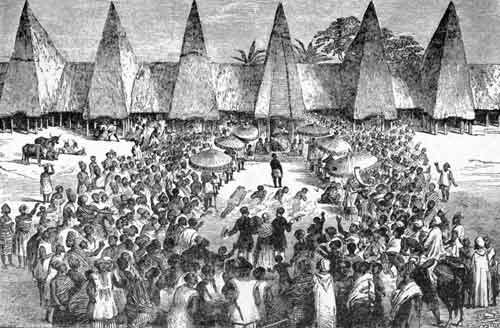The Yoruba People
The Yoruba people, known for their rich history, cultural heritage, and profound spiritual and moral philosophies, were once among Africa’s most urbanized ethnic groups. They lived in structured urban centers organized around powerful city-states, with Ile Ife being the nucleus. The Yoruba creation story paints a vivid picture of the origins of their world: with the help of Olorun/Olodumare and Orunmila, Obatala created land for Ile Ife using sand and a hen. This land would become the birthplace of Yoruba civilization.
By the 8th century BCE, Ile Ife emerged as a significant Yoruba kingdom, with Oduduwa, regarded as the progenitor of the Yoruba race, becoming the first Ooni of Ife. By the 11th century, Ile Ife was thriving with advancements in medicine, metallurgy, and sculpting, especially known for their naturalistic bronze, stone, and terracotta sculptures.

Between 1100 and 1600, Ile Ife held a preeminent position among Yoruba city-states, before the rise of the Oyo Empire. These city-states operated a unique republican monarchy, featuring councils of elders who deliberated on policies and elected new monarchs. This system prevented the monopolization of power by any single ruler. British Crown representative Commander Frederick Forbes, in his 1853 account, described Abeokuta as an extraordinary republic with a system of governance that rivaled any in the world.
The cornerstone of Yoruba society was Omoluwabi: a concept encompassing morality, good scruples, integrity, and respect. An Omoluwabi personified virtues such as:
- Iwa pele (gentle character)
- Oro Siso (spoken word)
- Iteriba (respect)
- Inu Rere (goodwill)
- Otito (truth)
- Iwa (character/virtue)
- Akinkanju (bravery)
- Ise (hard work)
- Opolo Pipe (intelligence)
- and Suuru (patience).
However, this unified and moral society faced turmoil with the advent of British colonialism in the mid-19th century. Capitalizing on the competition among European nations, the British Empire sought to safeguard its interests and counter French influence in Africa. By 1861, the coastal Yoruba city of Eko fell into British hands, marking the start of widespread subjugation. The British utilized psychological manipulation to dominate the Yoruba, distorting their history, demonizing their spiritual systems, and eroding their culture and language.
The introduction of radical individualism, a by-product of capitalism, disrupted the communal harmony of the Yoruba society, which operated on the principle of Ubuntu—“I am because we are.” This new ideology created competition and enmity among previously harmonious community members.
By the early 20th century, all of Yoruba land had succumbed to British domination. The British implemented indirect rule, appointing compliant monarchs to enforce their mandates. In 1914, the creation of Nigeria lumped disparate ethnic groups with differing languages, histories, and cultures into one colonial entity, stripping the Yoruba of their self-actualization and determination.
Despite this, the Yoruba Western Region flourished under the leadership of Chief Obafemi Awolowo, who introduced democratic socialism, free primary education, free healthcare, a television service, and a lucrative cocoa export industry. The prosperity attracted people from other regions and neighboring countries. However, political unrest led to a military takeover in 1966, ending autonomous self-rule and plunging the region into a brutal civil war.
After the civil war, the new system of centralized federal power led to widespread unemployment, corruption, infrastructural decay, and developmental stagnation. This over-centralization eroded Yoruba culture and way of life, resulting in a society marred by criminality and debauchery.
Once a proud people with a rich history, sound spiritual and moral philosophies, and a thriving civilization, the Yoruba now find themselves longing for their glorious past amidst a dire present.
Conclusion
The tale of the Yoruba is a poignant reminder of the resilience of a people with a remarkable heritage. Despite their current challenges, the Yoruba spirit endures, with a rich cultural legacy that continues to inspire and influence.


